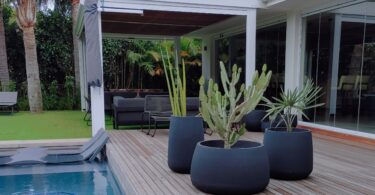With dam levels across the country at an all-time low and the prospect for good summer rainfall looking bleaker by the day, we should all do what we can to save water – starting at home…
In the house
● Fix any dripping taps (this applies to outdoor taps too).
● Insulate water pipes as well as the geyser.
● Turn off the tap between washing your face or hair, brushing your teeth and shaving.
● Wash your hands with the plug in and use cold water instead of hot.
● Take a short shower every day instead of a bath. When showering, switch off the water between soaping and rinsing. If you prefer to bath, don’t fill it up (a depth of 20cm is more than enough).
● Place a bucket in your shower to collect used water for lawns, shrubs and trees.
● Use low-flow showerheads (6-10 litres per minute), water-efficient washing machines and dual-flush toilet mechanisms (where there’s a button for liquid waste – 4 litres, and solid waste – 9 litres).
● Don’t fill the kettle – only boil enough for your needs. The same applies to other containers, like pots and pans (and cover them with lids when boiling). If you steam or boil vegetables, save the water rather than pouring it down the sink. It is full of nutrients and makes for a great fertiliser for watering your plants.
● A leaking toilet can waste up to 100 000 litres of water per year. To check for a leak, put a little food colouring in the cistern – if the colouring appears in the bowl without flushing, you have a silent leak.
● Avoid unnecessary flushing or using the toilet as a rubbish bin, and use ‘grey water’ from baths, washing machines and other safe sources to flush your toilet with.
● Soak and/or scrape dishes, plates and pots into the dustbin before washing them.
● Don’t rinse fruit and vegetables under running water – put the plug in, then use the water in the garden.
● Don’t thaw frozen food under running water.
● When waiting for hot water to come out of a tap, place a bucket underneath to catch the cold water to use later.
● Fully load the dishwasher before using it and set it on its most economical cycle.
● Ensure you have a full load of washing before using the washing machine, or invest in a machine that has load-detection technology and adjusts water consumption accordingly. Also, choose the cycle that is the most energy and water efficient when heavy-duty cleaning isn’t needed.
In the garden
● Avoid watering with hosepipes or a sprinkler system between 6am and 6pm.
● Don’t wash your car with a hosepipe – rather use a bucket. If you have to use a hose, use a sprayer that can be turned off in-between spraying the car.
● Avoid over-filling or backwashing your swimming pool excessively.
● Check for leaks and cover the pool if you can to reduce the amount of water lost to evaporation.
● Not filling your pool to the rim will ensure that less water is lost due to splashing while swimming.
● Make sure irrigation sprays target your garden and not your patio, driveway or the street.
● Select smaller plants rather than larger ones, and grow plants that need less water (exotic varieties usually require more water than indigenous species).
● Large-leafed plants need more water than slender-leaf varieties. Leaves that reflect more of the sun’s radiation (for example, grey or silver foliage) usually lose water at a lower rate than green leaves. Plants that can tolerate higher leaf temperatures also evaporate water at a lower rate. For example, herbs like rosemary and thyme have minimal water needs compared to larger-leafed basil and sage.
● Use mulch (leaves, bark, wood chips etc) in your garden to keep the ground moist under the plants. Mulch also helps to reduce run-off and evaporation.
● Create water basins around trees and shrubs and prune away any unnecessary lower branches and leaves from trees (fewer leaves means less moisture loss and this lowers the tree’s water requirements).
● Herbs need less water than vegetables, so plant them in their own bed and water them less frequently.
● Install a water tank rather than wasting rainwater to maximise roof run-off and redirect it to your garden.
● Choose plant containers carefully as different materials heat up quickly (like metal) or lose moisture because they are porous (like clay). Rather use metal or terracotta containers as outer, decorative pots, with smaller, less-porous pots inside to retain moisture.
● Control weeds – they steal water that would otherwise be available for other plants.
● Don’t waste water on unhealthy plants – rather remove or replace them.
● Increase the mowing height of your lawn to a minimum of 2cm to allow the grass to develop deeper root systems.
● Invest in garden structures that will provide shade in your garden where possible.
Share your water-saving ways with us or visit www.waterwise.co.za for more tips and advice.











Leave a Comment